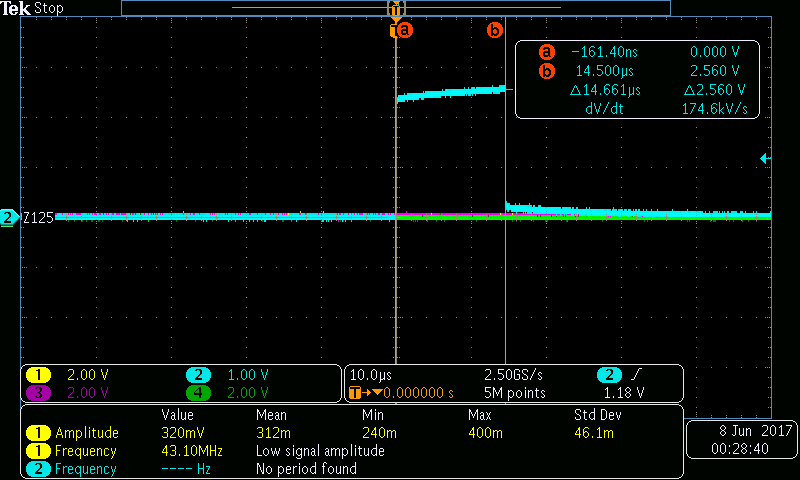Upon testing I am seeing some slowness in setting up the SPIS DMA buffers for the next transaction. I perform a SPIS transaction, and then call nrf_drv_spis_buffers_set(). Setting the SPIS buffers takes somewhere around 20 us to complete. This seems long. Is there way around this delay?
Note: I am also using the ESB radio protocol during these transactions.
I am having to force a delay on my SPI master in order to properly receive my data. Otherwise, I miss SPI transaction because of the SEMAPHORE lock.
Can I not use DMA? Would that be faster?
static void spi_transaction(uint32_t rx_len, uint32_t tx_len)
{
uint32_t rx_size = rx_len - SPI_COMMAND_SIZE;
uint32_t err_code = 0;if (spi_rx_buf[0] != 0) // Check received data for transaction type
switch (spi_rx_buf[0])
{
/* Starts the transmit */
case SPI_STRT_TX:
GPIOWrite(LED_4, LED_ON);
StartRadioTransmit((uint8_t*)&spi_rx_buf[SPI_COMMAND_SIZE], payload_length);
break;
case SPI_LOAD_TX_FIFO:
if (rx_size > 0)
{
app_sched_event_put(&rx_size, sizeof(uint16_t), radio_write_payload_event_handler);
GPIOWrite(LED_1, LED_ON); // TIMING OF SPI DMA STARTS HERE
}
break;
case SPI_LOAD_AND_TX:
if (rx_size > 0)
{
GPIOWrite(LED_4, LED_ON);
WriteRadioDataDirect((uint8_t*)&spi_rx_buf[SPI_COMMAND_SIZE], rx_size);
}
break;
case SPI_READ_RF:
clear_irq();
GPIOWrite(LED_2, LED_OFF); // Debugging
break;
case SPI_NOP:
break;
default:
break;
}
spi_rx_buf[0] = 0;
// set up the next transaction
SpiDma((uint8_t*)&spi_tx_buf[0], SPI_TX_SIZE, (uint8_t*)&spi_rx_buf[0], SPI_RX_SIZE);
return;
}
static void spi_slave_event_handler(nrf_drv_spis_event_t event)
{
if (event.evt_type == NRF_DRV_SPIS_XFER_DONE)
{
spi_state = SPI_BUSY;
spi_transaction(event.rx_amount, event.tx_amount);
}
if (event.evt_type == NRF_DRV_SPIS_BUFFERS_SET_DONE) // Event occurs after buffers are safely in DMA
{
spi_state = SPI_IDLE; // TIMING OF SPI DMA ENDS HERE
GPIOWrite(LED_1, LED_OFF); // Debugging
}
return;
}
I re-ran this using the example SPIS software with SDK 13. The delay was less, but I am only running the SPIS and nothing else. I observed this these results:



